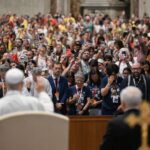Gospel: Mark 13:24-32
At that time, Jesus said: “But in those days, after that tribulation, the sun will be darkened, the moon will not give its light, the stars will fall from the sky, and the powers in the heavens will be shaken. Then they will see the Son of Man coming in clouds with great power and glory; then he will send his angels and gather his elect from the four winds, from the ends of the earth to the ends of the sky. Learn this lesson from the fig tree: as soon as its branches become tender and puts out its leaves, you know that summer is near. So also, when you see these things happening, know that he is near, at the very gates. Truly I tell you, this generation will certainly not pass away until all these things have happened. Heaven and earth will pass away, but my words will never pass away. But about that day or hour no one knows, not even the angels in heaven, nor the Son, but only the Father.”
Fruit: Live each day as if it were the first to bring all vigor, as if it were the last to prepare myself for the encounter with God.
Guidelines for reflection:
The gospel passages that speak to us about the end of the world invite us to reflect on the purpose of Christian life: holiness. Christ is the source and our model of holiness. By imitating his works, receiving the sacraments, and practicing charity, we attain holiness.
1. God’s gifts
When a person has suffered a serious accident and has saved their life by chance, they summarize that intense experience by saying: I have been born again. They have faced death face to face, and at the last moment, the thread of their life has not been broken. Moments like these help us value what life means. Every day, every hour, is a gift that many no longer have, an evident proof that the Lord continues to love us, keeps thinking of us, and sustains us in existence. This time we have in hand is a gift from God, a gift, but a gift for something. Around us, we see that everything has a purpose: the chair is for sitting, the bed for resting, a light bulb for seeing better, the phone for talking to a friend or family member. Everything has a purpose, a reason for being. And our life?
2. The hour of accountability
Besides a purpose, our life has an end. This earthly life will come to an end. We do not know when, where, how… Perhaps at 100 years old, maybe on an African island, or in my home surrounded by loved ones, or in a hospital, or in a traffic accident. The place, the time, the manner—no one knows. But we do know something with certainty: death will come. And with death, this gift ends, or rather, it transforms according to a key point in my life. Earthly life ends, and the one who gave us this great gift to manage will ask us for accounts. During these days, in the readings of the Mass, there is frequent mention of the coming of the Son of God, of an end of times, of judgment. The end of the liturgical season we call ordinary should make us think about the end of our ordinary time, of our earthly life.
3. At the sunset of life, I will be examined about love
We will die. We will be judged. But we have a great advantage: we know the content of that judgment, we know the questions of this final exam. How much would a student give to know at the beginning of the course the 5 or 10 questions of the final exam! How well prepared they would be! In the main subject, the subject of life, we already know the questions of the exam. Jesus Christ has told us, and many saints and Church men remind us. They are two words, or even one: Have you loved? St. John of the Cross, a great Spanish mystic and also a very practical man, summarizes it like this: “At the sunset of life, we will be examined about love,” and loving is giving oneself, totally surrendering to God in others, and to others for God.
Purpose: I will love those who live with me by offering them a small gesture of joy and kindness.









